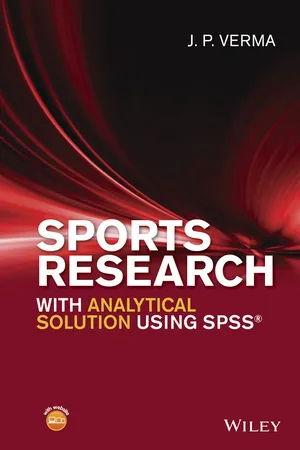
- English
- ePUB (mobile friendly)
- Available on iOS & Android
Sports Research with Analytical Solution using SPSS
About this book
A step-by-step approach to problem-solving techniques using SPSS® in the fields of sports science and physical education
Featuring a clear and accessible approach to the methods, processes, and statistical techniques used in sports science and physical education, Sports Research with Analytical Solution using SPSS® emphasizes how to conduct and interpret a range of statistical analysis using SPSS. The book also addresses issues faced by research scholars in these fields by providing analytical solutions to various research problems without reliance on mathematical rigor.
Logically arranged to cover both fundamental and advanced concepts, the book presents standard univariate and complex multivariate statistical techniques used in sports research such as multiple regression analysis, discriminant analysis, cluster analysis, and factor analysis. The author focuses on the treatment of various parametric and nonparametric statistical tests, which are shown through the techniques and interpretations of the SPSS outputs that are generated for each analysis. Sports Research with Analytical Solution using SPSS® also features:
- Numerous examples and case studies to provide readers with practical applications of the analytical concepts and techniques
- Plentiful screen shots throughout to help demonstrate the implementation of SPSS outputs
- Illustrative studies with simulated realistic data to clarify the analytical techniques covered
- End-of-chapter short answer questions, multiple choice questions, assignments, and practice exercises to help build a better understanding of the presented concepts
- A companion website with associated SPSS data files and PowerPoint® presentations for each chapter
Sports Research with Analytical Solution using SPSS® is an excellent textbook for upper-undergraduate, graduate, and PhD-level courses in research methods, kinesiology, sports science, medicine, nutrition, health education, and physical education. The book is also an ideal reference for researchers and professionals in the fields of sports research, sports science, physical education, and social sciences, as well as anyone interested in learning SPSS.
Tools to learn more effectively

Saving Books

Keyword Search

Annotating Text

Listen to it instead
Information
1
INTRODUCTION TO DATA TYPES AND SPSS OPERATIONS
LEARNING OBJECTIVES
- Understand different data types generated in research
- Learn the nature of variables
- Know various data cleaning methods
- Learn to install SPSS package in computer
- Prepare data file in SPSS
1.1 INTRODUCTION
1.2 TYPES OF DATA
Table of contents
- COVER
- TITLE PAGE
- TABLE OF CONTENTS
- PREFACE
- ABOUT THE COMPANION WEBSITE
- ACKNOWLEDGMENTS
- 1 INTRODUCTION TO DATA TYPES AND SPSS OPERATIONS
- 2 DESCRIPTIVE PROFILE
- 3 CORRELATION COEFFICIENT AND PARTIAL CORRELATION
- 4 COMPARING MEANS
- 5 INDEPENDENT MEASURES ANOVA
- 6 REPEATED MEASURES ANOVA
- 7 ANALYSIS OF COVARIANCE
- 8 NONPARAMETRIC TESTS IN SPORTS RESEARCH
- 9 REGRESSION ANALYSIS AND MULTIPLE CORRELATIONS
- 10 APPLICATION OF DISCRIMINANT FUNCTION ANALYSIS
- 11 LOGISTIC REGRESSION FOR DEVELOPING LOGIT MODEL IN SPORT
- 12 APPLICATION OF FACTOR ANALYSIS
- APPENDIX
- BIBLIOGRAPHY
- INDEX
- END USER LICENSE AGREEMENT
Frequently asked questions
- Essential is ideal for learners and professionals who enjoy exploring a wide range of subjects. Access the Essential Library with 800,000+ trusted titles and best-sellers across business, personal growth, and the humanities. Includes unlimited reading time and Standard Read Aloud voice.
- Complete: Perfect for advanced learners and researchers needing full, unrestricted access. Unlock 1.4M+ books across hundreds of subjects, including academic and specialized titles. The Complete Plan also includes advanced features like Premium Read Aloud and Research Assistant.
Please note we cannot support devices running on iOS 13 and Android 7 or earlier. Learn more about using the app